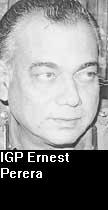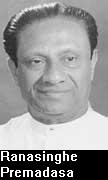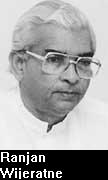 |
Hulftsdorp Hill12th April 1998 Batalanda: yes, there was tortureCommission says authorities and Police knew about it but no action taken By Mudliyar |
Front Page | |
|
Later it was announced that the government would release it to the media at an appropriate time. It is widely expected that the appropriate time as far as the government is concerned would be the eve of the Provincial Council elections. The government would begin its usual campaign to vilify the Opposition with the aid of the Batalanda Report. Unlike the Vijaya Kumaratunga, Denzil Kobbekaduwa and Lalith Athulathmudali reports where the findings were against Ranasinghe Premadasa and Ranjan Wijeratne, the Batalanda Commission inquired into the existence of torture camps at Batalanda, in the electorate of Ranil Wickremesinghe, the present leader of the main Opposition party, UNP. It was widely believed at that time that the Commission was appointed in the hope of implicating Mr. Wickremesinghe, with the knowledge of the existence of torture camps at Batalanda. One of Mr. Wickremesinghe's cooks gave evidence before the Commission and his evidence recorded in camera. It must be noted that unlike the Special Presidential Commissions which were established by JR Jayewardene, the Batalanda Commission inquired into the matters reflected on the warrant under the Commissions of Inquiry Act which had been in existence from 1948. A commission of inquiry, under the Commissions of Inquiry Act, has no power to recommend the deprivation of civic rights against anyone the commission comes to find adversely on. It can make recommendations to the government and the authorities to take appropriate action under the law. We publish exclusively the observations, recommendations and findings of the Commission. Once the official report is published we would be publishing a critique of the report. ''According to section 2 (1) of the Commissions of Inquiry Act our powers are limited to 'inquire into and report upon such administration, conduct or matter' "According to Section 7, 8 and 11 of the said Act the power of this Commission is limited to summon persons only as witnesses under Section 16 of this Act. Every person whose conduct is the subject of inquiry or who is in anyway implicated or concerned in the matter under inquiry, is entitled to be represented by one or more Attorney-at-Law at the whole of the inquiry, and any other person who he may consider it desirable that he should be represented, may by leave of the commission, be represented in the manner aforesaid. Unlike Section 16 of the Special Commission of Inquiry Act No. 7 of 1978, this Commission has no power to inform such persons who are implicated or concerned in the matter under inquiry. Under Section 16 of the Special Presidential Commission of Inquiry Act every person who is specified in a warrant issued under this law as a person whose conduct is the subject of an inquiry or as a person who is in anyway implicated or concerned in the matter under inquiry and any person who, in the opinion of the commission, is a person whose conduct should be the subject of inquiry or in the opinion of the commission is in anyway implicated or concerned in the matter under inquiry "shall he so informed" by the commission and shall after be is so informed be entitled to be represented by one or more Attorneys-at-Law at such stage of the inquiry as is relevant thereto and any other person who may consider it desirable that he should be so represented may, by leave of the commissioner, be represented in the manner aforesaid. Thus it is very clear that Section 16 of the Special Presidential Commission of Inquiry Law No. 7 of 1978 is different from Section 16 of the Commissions of Inquiry Act No. 17 of 1948. On a reading of the above provisions it seems that according to Section 16 of the Commissions of Inquiry Act a person who is implicated or concerned in the matter under inquiry if he so wishes as of right is entitled to be represented by Counsel at the inquiry.
In any case under the commissions of Inquiry Act. a commission has power only to summon as witnesses and not as persons concerned or implicated. Every person who is concerned and implicated in such inquiry can be summoned only as witnesses. Whereas under Section 16 of the Special Presidential Commissions of Inquiry Act the duty is cast on the commission to inform such person and the discretion to summon or not to summon is with the commission. Under the provisions of Commissions of Inquiry Act this commission has no power or Jurisdiction to find any person 'guilty' of any act or to recommend that the person be subject to civic disability. The powers given to a commission under the Special Presidential Commission of Inquiry Act are not conferred on a commission appointed under the Commissions of inquiry Act. The powers under Section 9 of the Special Presidential commission of Inquiry Act are not conferred on a commission appointed under the Commissions of Inquiry Act. In view of the above provisions, the powers of this commission are limited to summon persons only as witnesses; allow persons implicated or concerned to appear if they so desire and to inquire and report upon such matters referred to in the warrant.
|
||

|
Please send your comments and suggestions on this web site to |
|

 Justice
Dharmasiri Jayewickrema, Judge of the Court of Appeal and Mr. Nimal Dissanayka,
High Court judge of Colombo handed over the Batalanda Commission report
to the President on the 27th of March 1998. Though the appointed time given
to the Commissioners was at 5.30 p.m. the President as usual did not divert
her routine and met the judges at 8.30 p.m. Having handed over the report,
Justice Jayawickrema read extracts from the report and thereafter pondered
whether he should hand over to the media a summary of the findings. Mr.
Balapatabendi the secretariat to the President, stated that the Presidential
Secretary would do so in the near future.
Justice
Dharmasiri Jayewickrema, Judge of the Court of Appeal and Mr. Nimal Dissanayka,
High Court judge of Colombo handed over the Batalanda Commission report
to the President on the 27th of March 1998. Though the appointed time given
to the Commissioners was at 5.30 p.m. the President as usual did not divert
her routine and met the judges at 8.30 p.m. Having handed over the report,
Justice Jayawickrema read extracts from the report and thereafter pondered
whether he should hand over to the media a summary of the findings. Mr.
Balapatabendi the secretariat to the President, stated that the Presidential
Secretary would do so in the near future.
 The
discretion to appear and to be represented is with such person. There is
no provision under this act that the commission should take the initiative
and inform such person.
The
discretion to appear and to be represented is with such person. There is
no provision under this act that the commission should take the initiative
and inform such person. 